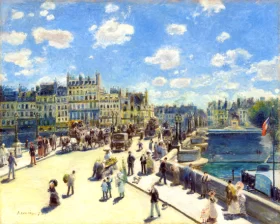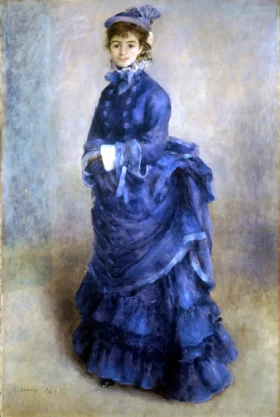사이트 전체 5% 할인 | 결제 시 KMKR5 코드를 사용하세요.
- Choose your Country
사이트 전체 5% 할인 | 결제 시 KMKR5 코드를 사용하세요.
피에르 오귀스트 르누아르
Pierre-Auguste Renoir ( 25 February 1841 – 3 December 1919) was a French painter originally associated with the Impressionist movement. His early works were typically Impressionist snapshots of real life, full of sparkling colour and light. By the mid-1880s, however, he had broken with the movement to apply a more disciplined, formal technique to portraits and figure paintings, particularly of women as a celebrator of beauty and feminine sensuality.
Pierre-Auguste Renoir was born in Limoges, Haute-Vienne, France, in 1841. Renoir was born into a family of artisans. His father, a tailor who had seven children, moved with his family to Paris about 1845. Renoir’s family moved to Paris in search of more favorable prospects. The location of their home, in rue d’Argenteuil in central Paris, placed Renoir in proximity to the Louvre. Renoir demonstrated his gift at an early age. Quickly recognizing his talent, his parents apprenticed him, at age 13, to work in a porcelain factory, where he learned to decorate plates with bouquets of flowers.
His skill and the great pleasure he took in his work soon convinced him he should study painting in earnest. Having saved a little money, he decided, in 1862, to take evening courses in drawing and anatomy at the École des Beaux-Arts as well as painting lessons at the studio of Charles Gleyre, a Swiss painter who had been a student of the 19th-century Neoclassical painter Jean-Auguste-Dominque Ingres. Although the academic style of his teacher did not suit Renoir, he nevertheless accepted its discipline in order to acquire the elementary skills needed to become a painter. It was here that he met Alfred Sisley, Frédéric Bazille, and Claude Monet. Renoir had his first success at the Salon of 1868 with his painting Lise with a Parasol (1867), which depicted Lise Tréhot, his lover at the time.
Renoir was inspired by the style and subject matter of previous modern painters Camille Pissarro and Édouard Manet. After a series of rejections by the Salon juries, he joined forces with Monet, Sisley, Pissarro, and several other artists to mount the first Impressionist exhibition in April 1874, in which Renoir displayed six paintings. Although the critical response to the exhibition was largely unfavorable, Renoir’s work was comparatively well received. That same year, two of his works were shown with Durand-Ruel in London.
Conditions were ripe for the birth of a new pictorial language, and Impressionism, bursting upon the scene, attracted notoriety with the first Impressionist exposition of 1874, held independently of the official Salon. It took 10 years for the movement to acquire its definitive form, its independent vision, and its unique perceptiveness. But one can point to 1874 as the year of departure for the movement that subsequently spawned modern art. Renoir’s work is a perfect illustration of this new approach in thought and technique. By using small, multicoloured strokes, he evoked the vibration of the atmosphere, the sparkling effect of foliage, and especially the luminosity of a young woman’s skin in the outdoors. Renoir and his companions stubbornly strove to produce light-suffused paintings from which black was excluded, but their pursuits led to many disappointments: their paintings, so divergent from traditional formulas, were frequently rejected by the juries of the Salon and were extremely difficult to sell.
Renoir, because of his fascination with the human figure, was distinctive among the others, who were more interested in landscape. Thus, he obtained several orders for portraits and was introduced, thanks to the publisher Georges Charpentier, to upper-middle-class society, from whom he obtained commissions for portraits, most notably of women and children.
Renoir mastered the ability to convey his immediate visual impressions, and his paintings showed great vitality, emphasizing the pleasures of life despite the financial worries that troubled him. He displayed mostly portraits at the second Impressionist exhibition in 1876. He contributed a more diverse range of paintings the next year when the group presented its third exhibition; several of his masterpieces date from this period: La Loge (1874; Theatre Box), Dance at Le Moulin de la Galette (1876), Luncheon of the Boating Party (1880–81). By the end of the 1870s, particularly after the success of his painting Mme Charpentier and her Children (1878) at the Salon of 1879, Renoir was a successful and fashionable painter. Charpentier organized a personal exposition for the works of Renoir in 1879 in the gallery La Vie Moderne.
In 1881 and 1882 Renoir made several trips to Algeria, Italy, and Provence, and these eventually had a considerable effect on his art and on his life. During his journey to Italy, he discovered Raphael and the hallmarks of classicism: the beauty of drawing, the purity of a clear line to define a form, and the expressive force of smooth painting when used to enhance the suppleness and modeling of a body.
In 1890, he married Aline Victorine Charigot, a dressmaker twenty years his junior, who, along with a number of the artist’s friends, had already served as a model for Le Déjeuner des canotiers (Luncheon of the Boating Party; she is the woman on the left playing with the dog) in 1881, and with whom he had already had a child, Pierre, in 1885. After marrying, Renoir painted many scenes of his wife and daily family life including their children and their nurse, Aline’s cousin Gabrielle Renard. The Renoirs had three sons: Pierre Renoir (1885–1952), who became a stage and film actor; Jean Renoir (1894–1979), who became a filmmaker of note; and Claude Renoir (1901–1969), who became a ceramic artist.
Around 1892, Renoir developed rheumatoid arthritis. In 1907, he moved to the warmer climate of “Les Collettes,” a farm at the village of Cagnes-sur-Mer, Provence-Alpes-Côte d’Azur, close to the Mediterranean coast. Renoir painted during the last twenty years of his life even after his arthritis severely limited his mobility. He developed progressive deformities in his hands and ankylosis of his right shoulder, requiring him to change his painting technique. It has often been reported that in the advanced stages of his arthritis, he painted by having a brush strapped to his paralyzed fingers, but this is erroneous; Renoir remained able to grasp a brush, although he required an assistant to place it in his hand.
Renoir’s paintings during this period still embodied a cheerful attitude toward life. His themes became more personal and intimate, focusing on portraits of his wife, his children, and Gabrielle, his maid, who often also posed for his nude paintings. His still lifes were composed of flowers and fruits from his own garden, and the landscapes were those that surrounded him. The nudes, especially, reflect the serenity that he found in his work. Examples of this period include The Artist’s Family (1896) and Girl Sleeping (c. 1897). He attempted to embody his admiration for the female form in sculpture, with the assistance of young Richard Guino. Since Renoir was no longer able to do sculpture himself, Guino became, about 1913, the skillful instrument who willingly followed his directions. He yielded before the personality of Renoir and succeeded so well that the works have all the qualities of Renoir’s style.
Renoir’s wife died in 1915 after having returned from Gérardmer, where she had gone to see their son Jean, who had been seriously wounded in the war, and who would go on to become an important filmmaker. Renoir survived his wife by four years. Several months before his death, he was able to go to Paris to see his Portrait of Madame Georges Charpentier, which had been recently acquired by the state. On that occasion, In 1919, several friends wheeled him for the last time through the Louvre to view the masterpieces that he had venerated throughout his life.
Renoir died at Cagnes-sur-Mer on 3 December 1919.
Renoir’s, Au Moulin de la Galette became one of the world’s most expensive paintings when it sold for $78 million back in 1990 at Sotheby’s in New York City, New York, L’ombrelle sold for £9,673,250 at auction inFfeb 2013.
Read more1–100/581개 결과 표시

Dance at Le Moulin De La Galette
으로 피에르 오귀스트 르누아르크기 시작 ₩383,819
Luncheon of the Boating Party
으로 피에르 오귀스트 르누아르크기 시작 ₩376,759
Pont Neuf, Paris
으로 피에르 오귀스트 르누아르크기 시작 ₩304,169
Venice (The Doge’s Palace)
으로 피에르 오귀스트 르누아르크기 시작 ₩272,359
Two Sisters (On the Terrace) 1881
으로 피에르 오귀스트 르누아르크기 시작 ₩279,189
The Umbrellas
으로 피에르 오귀스트 르누아르크기 시작 ₩347,799
The Swing 1876
으로 피에르 오귀스트 르누아르크기 시작 ₩312,119
Pink and Blue – the Cahen D´anvers Girls 1881
으로 피에르 오귀스트 르누아르크기 시작 ₩351,759
A Girl with a Watering Can
으로 피에르 오귀스트 르누아르크기 시작 ₩292,829
Two Young Girls at the Piano 1892
으로 피에르 오귀스트 르누아르크기 시작 ₩308,139
Mme. Charpentier and Her Children, 1878
으로 피에르 오귀스트 르누아르크기 시작 ₩356,169
By the Water
으로 피에르 오귀스트 르누아르크기 시작 ₩296,219
Lunch at the Restaurant Fournaise
으로 피에르 오귀스트 르누아르크기 시작 ₩305,079
La Grenouillère 1869
으로 피에르 오귀스트 르누아르크기 시작 ₩279,189
Bathing on the Seine 1869
으로 피에르 오귀스트 르누아르크기 시작 ₩292,829
La Grenouillere
으로 피에르 오귀스트 르누아르크기 시작 ₩303,049
Dancer
으로 피에르 오귀스트 르누아르크기 시작 ₩313,269
The Blue Lady
으로 피에르 오귀스트 르누아르크기 시작 ₩306,459
Algerian Girl
으로 피에르 오귀스트 르누아르크기 시작 ₩279,189
By the Seashore
으로 피에르 오귀스트 르누아르크기 시작 ₩279,189
Portrait of Mademoiselle Irène Cahen D’anvers (Little Irene)
으로 피에르 오귀스트 르누아르크기 시작 ₩272,359
Portrait of Mme. Paulin
으로 피에르 오귀스트 르누아르크기 시작 ₩296,239
Sleeping Girl with a Cat
으로 피에르 오귀스트 르누아르크기 시작 ₩286,009
Summer
으로 피에르 오귀스트 르누아르크기 시작 ₩303,049
Portrait of Marthe Bérard 1879
으로 피에르 오귀스트 르누아르크기 시작 ₩333,669
Monet Painting in his Garden at Argenteuil
으로 피에르 오귀스트 르누아르크기 시작 ₩275,769
Alphonsine Fournaise
으로 피에르 오귀스트 르누아르크기 시작 ₩279,189
The Large Bathers
으로 피에르 오귀스트 르누아르크기 시작 ₩404,969
The theater Box
으로 피에르 오귀스트 르누아르크기 시작 ₩304,169
La Loge Or L’avant-Scène
으로 피에르 오귀스트 르누아르크기 시작 ₩304,169
The Clown
으로 피에르 오귀스트 르누아르크기 시작 ₩303,049
At the theatre (La Première Sortie)
으로 피에르 오귀스트 르누아르크기 시작 ₩312,119
Dance at Bougival
으로 피에르 오귀스트 르누아르크기 시작 ₩391,259
Country Dance
으로 피에르 오귀스트 르누아르크기 시작 ₩428,839
Dance in the City
으로 피에르 오귀스트 르누아르크기 시작 ₩424,899
Alfred Sisley with his Wife
으로 피에르 오귀스트 르누아르크기 시작 ₩324,019
The Apple Seller
으로 피에르 오귀스트 르누아르크기 시작 ₩351,009
The Daughters of Catulle Mendès
으로 피에르 오귀스트 르누아르크기 시작 ₩326,519
A Box in the theater Des Varietes
으로 피에르 오귀스트 르누아르크기 시작 ₩316,089
Au Théâtre, La Loge, 1894
으로 피에르 오귀스트 르누아르크기 시작 ₩300,189
Gabrielle Renard and infant Son Jean Renoir, 1895
으로 피에르 오귀스트 르누아르크기 시작 ₩296,219
Woman Arranging Flowers 1917
으로 피에르 오귀스트 르누아르크기 시작 ₩279,189
The White Pierrot
으로 피에르 오귀스트 르누아르크기 시작 ₩286,009
Claude Renoir in Clown Costume
으로 피에르 오귀스트 르누아르크기 시작 ₩313,269
Diana Als Jägerin
으로 피에르 오귀스트 르누아르크기 시작 ₩309,859
Bather with a Griffon Dog – Lise on the Bank of the Seine
으로 피에르 오귀스트 르누아르크기 시작 ₩313,269
Parisiennes in Algerian Costume Or Harem 1872
으로 피에르 오귀스트 르누아르크기 시작 ₩272,359
Odalisque
으로 피에르 오귀스트 르누아르크기 시작 ₩340,459
The Guitar Player
으로 피에르 오귀스트 르누아르크기 시작 ₩282,599
Woman with a Guitar
으로 피에르 오귀스트 르누아르크기 시작 ₩272,359
Girl with a Guitar
으로 피에르 오귀스트 르누아르크기 시작 ₩283,479
Young Spanish Woman with a Guitar 1898
으로 피에르 오귀스트 르누아르크기 시작 ₩276,449
Young Girls at the Piano 1892
으로 피에르 오귀스트 르누아르크기 시작 ₩312,119
Woman at the Piano
으로 피에르 오귀스트 르누아르크기 시작 ₩279,189
Young Girls at the Piano
으로 피에르 오귀스트 르누아르크기 시작 ₩296,219
Yvonne and Christine Lerolle at the Piano
으로 피에르 오귀스트 르누아르크기 시작 ₩313,249
The Excursionist 1888
으로 피에르 오귀스트 르누아르크기 시작 ₩279,189
The Daughters of Durand Ruel
으로 피에르 오귀스트 르누아르크기 시작 ₩304,169
In the Café 1877
으로 피에르 오귀스트 르누아르크기 시작 ₩340,259
Tilla Durieux
으로 피에르 오귀스트 르누아르크기 시작 ₩279,189
Buste De Femme, De Profil
으로 피에르 오귀스트 르누아르크기 시작 ₩272,359
Girl with a Blue Ribbon 1888
으로 피에르 오귀스트 르누아르크기 시작 ₩272,359
Confidence, 1897
으로 피에르 오귀스트 르누아르크기 시작 ₩304,169
At the Milliner’s 1878
으로 피에르 오귀스트 르누아르크기 시작 ₩312,119
Lovers
으로 피에르 오귀스트 르누아르크기 시작 ₩316,089
La Promenade
으로 피에르 오귀스트 르누아르크기 시작 ₩304,169
After the Luncheon
으로 피에르 오귀스트 르누아르크기 시작 ₩326,519
Boating Couple
으로 피에르 오귀스트 르누아르크기 시작 ₩286,009
Portrait of Madame Claude Monet
으로 피에르 오귀스트 르누아르크기 시작 ₩292,829
Camille Monet Reading
으로 피에르 오귀스트 르누아르크기 시작 ₩275,769
Children’s Afternoon at Wargemont
으로 피에르 오귀스트 르누아르크기 시작 ₩349,409
The Artist’s Family
으로 피에르 오귀스트 르누아르크기 시작 ₩356,169
Sailor Boy
으로 피에르 오귀스트 르누아르크기 시작 ₩326,869
Jean as a Huntsman
으로 피에르 오귀스트 르누아르크기 시작 ₩326,869
Woman with a Fan
으로 피에르 오귀스트 르누아르크기 시작 ₩272,359
Woman with Fan
으로 피에르 오귀스트 르누아르크기 시작 ₩275,769
Lady with Fan
으로 피에르 오귀스트 르누아르크기 시작 ₩289,419
Madame Hériot
으로 피에르 오귀스트 르누아르크기 시작 ₩265,519
Girl with a Fan 1881
으로 피에르 오귀스트 르누아르크기 시작 ₩286,009
Femme a L’ombrelle Assise Dans Le Jardin (Lise Tréhot)
으로 피에르 오귀스트 르누아르크기 시작 ₩272,359
Jeune Femme a L’ombrelle, 1872
으로 피에르 오귀스트 르누아르크기 시작 ₩282,599
Femme a L’ombrelle Et Enfant
으로 피에르 오귀스트 르누아르크기 시작 ₩272,359
Femme Cueillant Des Fleurs
으로 피에르 오귀스트 르누아르크기 시작 ₩272,359
Acrobats at the Cirque Fernando (Francisca and Angelina Wartenberg)
으로 피에르 오귀스트 르누아르크기 시작 ₩312,119
Enfant Assis En Robe Bleue
으로 피에르 오귀스트 르누아르크기 시작 ₩272,359
La Jeune Fille Au Cygne Ou La Jeune Fille Au Héron
으로 피에르 오귀스트 르누아르크기 시작 ₩279,189
Conversation
으로 피에르 오귀스트 르누아르크기 시작 ₩300,189
Double Portrait De Jeanne Baudot
으로 피에르 오귀스트 르누아르크기 시작 ₩371,529
Jeunes Filles Jouant Au Volant
으로 피에르 오귀스트 르누아르크기 시작 ₩326,519
Femme a L’ombrelle
으로 피에르 오귀스트 르누아르크기 시작 ₩272,359
Femme Au Chapeau
으로 피에르 오귀스트 르누아르크기 시작 ₩286,009
Gabrielle and Coco Playing Dominos
으로 피에르 오귀스트 르누아르크기 시작 ₩284,279
Girl in Gold Flowers Woman in White Hat, Circa 1895
으로 피에르 오귀스트 르누아르크기 시작 ₩272,359
Girls in Black
으로 피에르 오귀스트 르누아르크기 시작 ₩304,169
La Lecture
으로 피에르 오귀스트 르누아르크기 시작 ₩304,169
Young Girls Looking at an Album
으로 피에르 오귀스트 르누아르크기 시작 ₩304,169
La Tapisserie Dans Le Parc, Camille Monet
으로 피에르 오귀스트 르누아르크기 시작 ₩275,769
The Umbrella, 1878
으로 피에르 오귀스트 르누아르크기 시작 ₩275,769
La Fête a Saint-Cloud
으로 피에르 오귀스트 르누아르크기 시작 ₩255,999
Le Pêcheur a La Ligne
으로 피에르 오귀스트 르누아르크기 시작 ₩305,079




































































































